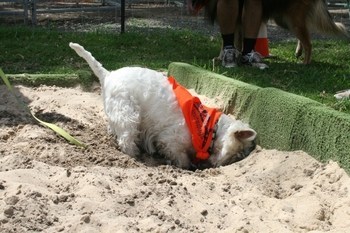
Table of Contents
Westie characteristics
Westies have a larger than life personality despite their small size. They can be strong-willed, a little stubborn, and independent.
However, they are friendly, affectionate and love company of both humans and other animals. There happy character and fun antics often make their owners laugh.
They can be quite possessive of their toys or food, and are often diggers. Although they are not usually yappy they can alert bark and make good watchdogs.
Overall, with good socialization and training, Westies are well behaved. However, with any dog behavior issues can develop.
Are Westies easy to train
In theory, a West Highland White Terrier should be easy to train. They are certainly intelligent and learn quickly. However, the Westie can be strong-willed and independent. There is a big difference between learning quickly and being obedient.
The key to success with training a Westie is to manage their focus, be consistent with the rules and boundaries, and provide effective leadership. If your West Highland White Terrier thinks they are in charge you have very little hope of being able to manage them.
Ideally, training a Westie should start young. This will improve the chance of showing that you’re in charge. Westies often respond best to training that uses a food reward system.
To be able to have a calm and well behaved Westie it is crucial to understand their temperament, instinctive drive, and personality.
Causes of behavior problems in Westies
If you are consistent with your training and establish yourself a calm and stable leader you will have a well mannered and behaved Westie.
If your Westie does develop some behavior issues it is most likely due to three main causes.
Boredom and pent up energy – being high energy and highly intelligent means your Westie will require plenty of exercise and activities, enrichment, and mental stimulation. For a guide to Westie exercise see here.
Rules and boundaries – a lack of consistency with the rules and boundaries can result in a Westie thinking they are in charge.
Fear – this can result in behaviors such as lunging and barking at people or dogs and anxiety such as separation anxiety.
We will look at some common behavior issues with Westies and how to go about fixing the problem.
Potential Westie behavior issues
Excessive barking
Nuisance barking is not really a trait of the breed. Although many terrier breeds can be yappy, generally the Westie is not.
There are many Westie owners who would dispute this. They obviously bark when they feel the need arises. If your Westie is barking a lot at anything that moves or every sound they hear it is a training or other behavior issue.
There are many reasons dogs bark including being overexcited, warning somebody is there, anxiety, boredom, and attention-seeking behavior.
Yelling at your dog to stop usually doesn’t work and often makes them bark more. To a dog you yelling is like barking. They think you are barking so they think they should bark some more.
With excessive barking, a dog will often get into a more aroused state the more they bark. The trick is to stop this state before it gets too high. Teach them a “quiet command” and provide redirection. This can be as simple as getting their attention from the first bark with a treat or toy they like.
For a full guide to Westie nuisance barking and solutions see here.
Digging
Digging is an instinctive behavior in dogs. Many West Highland White Terriers can be diggers due to their origins as ratting dogs that included digging up the burrows of prey. You can’t completely train instinctive behavior out of a dog, but you can redirect it.

Often a bored Westie can resort to digging either to escape to find adventure or to occupy themselves. For more on stopping a Westie digging see here.
Destructive behavior
Destructive behavior usually involves chewing and destroying your property. This can include furniture, clothing, and items around the house. In puppies, a certain amount of destructive chewing is expected as they are exploring the world and around 5 to 6 months will also be teething.
The most common reason for destructive chewing is boredom. Ensure your Westie is not only getting plenty of physical activity but plenty of other forms of enrichment to challenge their minds also.
Another way to tackle this problem is to remove items they may chew if possible or use a deterrent such as a bitter-tasting spray. See chew deterrents on Amazon here.
Redirect the behavior by providing your Westie with plenty of chew toys. Chewing itself is not a bad thing for your dog to do unless it is your stuff. Chewing is good for dental health, to occupy your dog, and for stress relief. When a dog chews they release endorphins to the brain making them feel calm and happy.
For the best chew toys for dogs see here.
Anxiety
Anxiety is a psychological and behavioral problem and can be improved and even fixed. This may be fear-based anxiety or separation and isolation anxiety. Westies are generally very confident and have a big personality. If your Westie has an anxiety issue it is preventing them from being who they really are.
A lot of anxiety in dogs can occur when they are home alone. For a guide to helping a dog with anxiety when home alone see here.
Toileting inside
If your Westie is toileted trained and suddenly starts toileting inside there may be a medical cause. Consult your vet to eliminate any possible health issues. Another reason for a sudden change in toileting behavior may be psychological. Has something changed in their environment or has there been an event occur?
Chasing cats
The West Highland Terrier, like all terriers, was bred to hunt, chase, and kill vermin. This means that they are naturally predatory towards small furry animals.
Westies are more tolerant of cats than most terrier breeds, especially cats that are part of the family. However, some Westies can be dominant and aggressive towards strange cats.
Every West Highland Terrier is an individual and with socialization and training, the majority of Westies can learn to be good with cats
Ultimately, it comes down to how you go about introducing and conditioning the Westie and cat. Even though Westies have a predatory prey drive towards small animals they are also a friendly and gentle dog. They are also highly intelligent and respond well to the right training.
For a guide to training a Westie to be good with a cat see here.
Lunging towards other dogs and people
This behavior is based on fear and it is the perception by the dog of a potential threat or danger. It can also be an indication that the dog doesn’t see you as the leader and they need to protect you. This can also occur with dogs that haven’t been socialized well.
Often this can be a serious problem and you may need the help of an experienced qualified dog behaviorist.
Leash pulling
There are many reasons a dog will pull on the leash. They may be in a hurry to get where they are going, to meet another dog, or chase something. Ultimately, all these things have the same cause. The dog is getting into an excited state. It is not about stopping the dog pulling. Rather about keeping the dog calm and relaxed on the leash.
Summary – Behavior issues in West Highland White Terrier
In general, Westies are well behaved and obedient. When they do have a behavior problem it is usually in 90% of cases the result of boredom and pent up energy. It is crucial to provide your Westie with daily exercise and mental stimulation.
Westies can also be quite spirited and strong-willed. Being consistent with the rules and boundaries will let them know what you expect and what is not acceptable.
Westie related posts